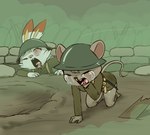
world war 1
World War I (WWI or WW1), also known as the First World War, or the Great War, was a global war centred in Europe that began on 28 July 1914 and lasted until 11 November 1918. More than 70 million military personnel, including 60 million Europeans, were mobilised in one of the largest wars in history. Over 9 million combatants and 7 million civilians died as a result of the war (including the victims of a number of genocides), a casualty rate exacerbated by the belligerents' technological and industrial sophistication, and the tactical stalemate caused by trench warfare, a grueling form of warfare in which the defender held the advantage. It was one of the deadliest conflicts in history, and paved the way for major political changes, including revolutions in many of the nations involved.
The war drew in all the world's economic great powers, assembled in two opposing alliances: the Allies (based on the Triple Entente of the United Kingdom/British Empire, France and the Russian Empire) versus the Central Powers of Germany and Austria-Hungary. Although Italy was a member of the Triple Alliance alongside Germany and Austria-Hungary, it did not join the Central Powers, as Austria-Hungary had taken the offensive, against the terms of the alliance. These alliances were reorganised and expanded as more nations entered the war: Italy, Japan and the United States joined the Allies, while the Ottoman Empire and Bulgaria joined the Central Powers.
The trigger for the war was the assassination of Archduke Franz Ferdinand of Austria, heir to the throne of Austria-Hungary, by Yugoslav nationalist Gavrilo Princip in Sarajevo on 28 June 1914. This set off a diplomatic crisis when Austria-Hungary delivered an ultimatum to the Kingdom of Serbia, and entangled international alliances formed over the previous decades were invoked. Within weeks, the major powers were at war and the conflict soon spread around the world.
On 28 July, the Austro-Hungarians declared war on Serbia and subsequently invaded. As Russia mobilised in support of Serbia, Germany invaded neutral Belgium and Luxembourg before moving towards France, leading the United Kingdom to declare war on Germany. After the German march on Paris was halted, what became known as the Western Front settled into a battle of attrition, with a trench line that would change little until 1917. Meanwhile, on the Eastern Front, the Russian army was successful against the Austro-Hungarians, but was stopped in its invasion of East Prussia by the Germans. In November 1914, the Ottoman Empire joined the Central Powers, opening fronts in the Caucasus, Mesopotamia and the Sinai. Italy joined the Allies in 1915 and Bulgaria joined the Central Powers in the same year, while Romania joined the Allies in 1916, followed by the United States in 1917.
The Russian government collapsed in March 1917, and a subsequent revolution in November brought the Russians to terms with the Central Powers via the Treaty of Brest Litovsk, which constituted a massive German victory. After a stunning German offensive along the Western Front in the spring of 1918, the Allies rallied and drove back the Germans in a series of successful offensives. On 4 November 1918, the Austro-Hungarian empire agreed to an armistice, and Germany, which had its own trouble with revolutionaries, agreed to an armistice on 11 November 1918, ending the war in victory for the Allies.
By the end of the war, the German Empire, Russian Empire, Austro-Hungarian Empire and the Ottoman Empire had ceased to exist. National borders were redrawn, with several independent nations restored or created, and Germany's colonies were parceled out among the winners. During the Paris Peace Conference of 1919, the Big Four (Britain, France, the United States and Italy) imposed their terms in a series of treaties. The League of Nations was formed with the aim of preventing any repetition of such a conflict. This effort failed, and economic depression, renewed European nationalism, weakened member states, and the German feeling of humiliation contributed to the rise of Nazism. These conditions eventually contributed to World War II.
*Upon further examined information, the death toll was raised to 37 million, with the Central Powers suffering 15 million losses.
**It is estimated that including all life on earth that was destroyed by actions of the war would equal 100million.
The following tags are aliased to this tag: world_war_i, world_war_one, ww1, wwi (learn more).

